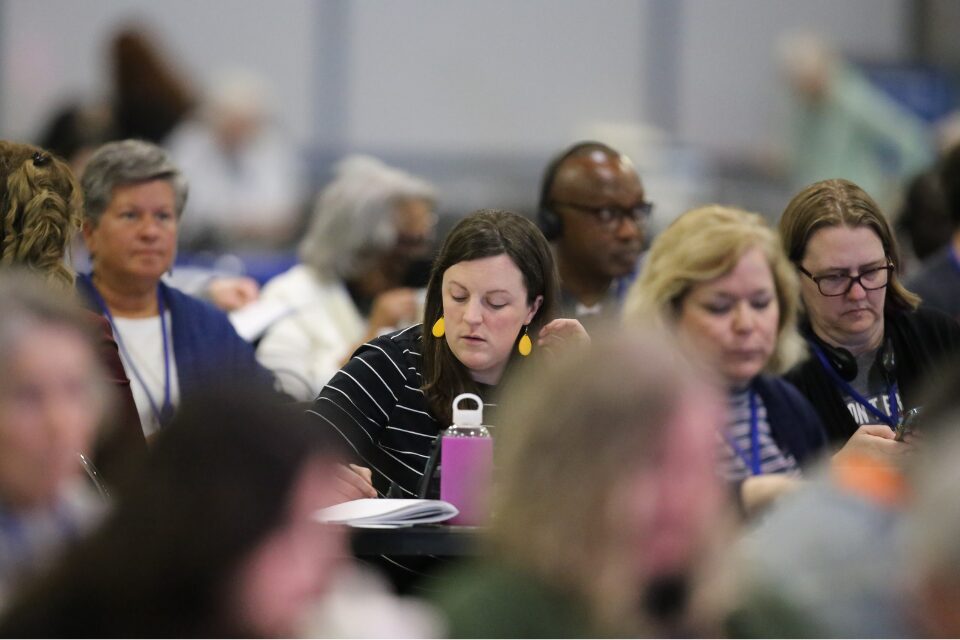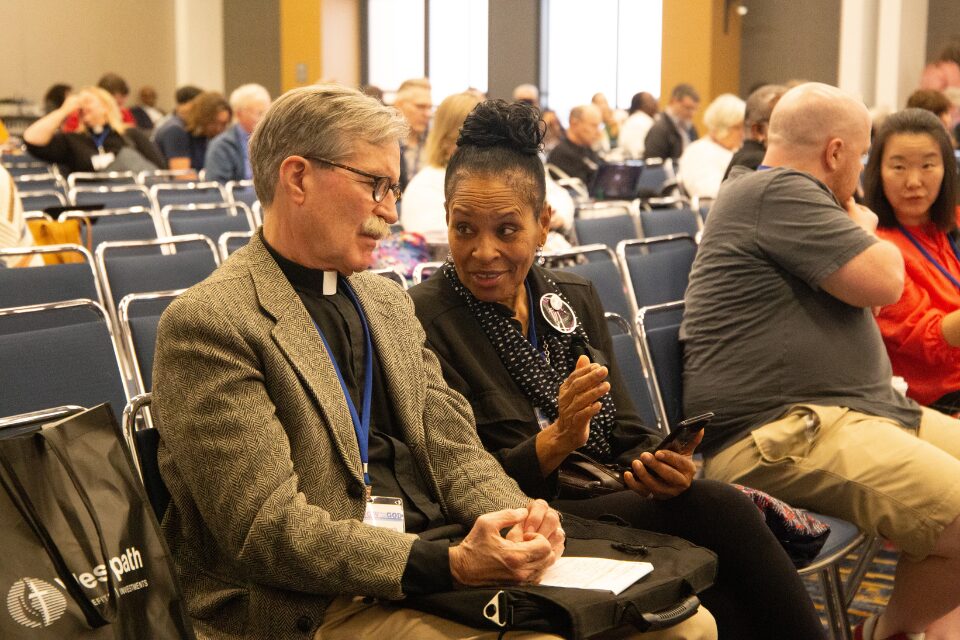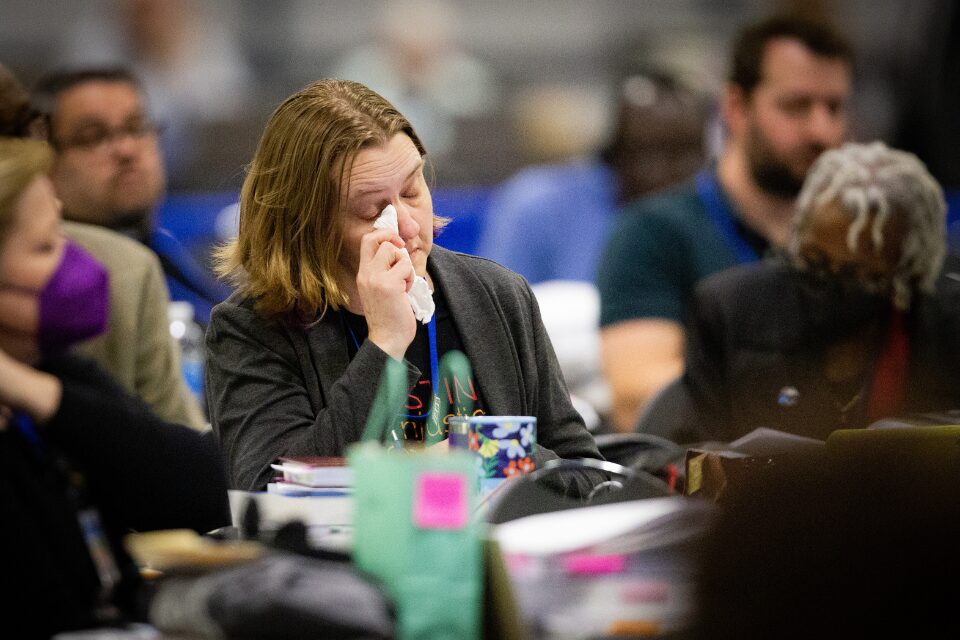General Conference delegates approved the final section of the Revised Social Principles, removing the “incompatibility” phrase, which has been a source of harmful language to LGBTQ persons since its adoption in 1972.
JAMES DEATON
Content Editor, Michigan Conference
HEATHER HAHN
Assistant News Editor, UM News
During the afternoon plenary session on Thursday, May 2, delegates at the 2024 General Conference passed the final section of the Revised Social Principles. This document reflects The United Methodist Church’s response to today’s most pressing social issues.
By a vote of 523 to 161 after a lengthy debate, delegates eliminated the 52-year-old assertion in the denomination’s Social Principles that the practice of homosexuality is “incompatible with Christian teaching.” The United Methodist Church’s condemnation of homosexuality — which sparked a half-century of conflict — is now no more.
In the same vote, delegates affirmed a clarifying amendment that defines “marriage as a sacred, lifelong covenant that brings two people of faith (adult man and adult woman of consenting age or two adult persons of consenting age) into a union of one another and into deeper relationship with God and the religious community.”
For Ruth Sutton, lay reserve delegate from Sanford UMC, the vote today “takes care of the harmful language [toward LGBTQ persons]. That was the big thing for me, personally.” The 1972 General Conference added the “incompatibility” phrase to the Social Principles, and decades of legislation followed, adding harmful language to the Book of Discipline. Much of that language has been reversed during the 2024 General Conference.
The amendment to Paragraph 161 in the Revised Social Principles came from Molly Hlekani Mwayera, a delegate from the Zimbabwe East Conference and newly elected member of the denomination’s Judicial Council.
She added the amendment for a “double-barrel” definition of marriage that includes both a man and a woman, in line with the law in much of the world, including her home country, and two adults, in line with the law in other parts of the world, including the United States.
“With this vote, one important thing,” said lay reserve delegate Gordon Grigg from Ishpeming: Wesley UMC, “is that we amended it to make sure everyone’s voice was heard and everyone was considered. That shows we are a ‘big tent’ Methodist church.”
Rev. Megan Walther, clergy delegate from Clarkston UMC, agreed. “The inclusion of the amendment creates space for United Methodists to have a variety of understandings without doing harm.”

Before the May 2 vote, General Conference had already adopted most of the revised Social Principles on the consent calendar. These are business items bundled into a single action item.
With the vote, delegates have adopted the entire slate of revised Social Principles submitted by the General Board of Church and Society, the denomination’s social witness agency.
The Revised Social Principles came after an international, multiyear process authorized by the 2012 General Conference to develop a “more globally relevant, theologically founded, and succinct” version.
Church and Society carried out that effort with a writing team of 52 United Methodists from Africa, Europe, the Philippines, and the United States, who drafted the proposed revision. That draft then received input from more than 4,000 United Methodists worldwide before the final submission.
John Hill, Church and Society’s interim top executive, said days before the May 2 vote that his agency hopes the language in the Revised Social Principles will resource and equip ministry in as many settings around the world as possible.
“Around the issues of human sexuality and marriage, we have a church whose local contexts are dramatically different,” Hill said. “So, our hope was to have statements that could speak theologically to these matters but not to any specific context. Instead, they could be applied across contexts.”

The Social Principles are grounded in biblical principles and Wesleyan ideals, and this revision reflects the worldwide nature of the church. The committee that crafted the document sought to write each principle concisely and clearly, allowing all United Methodists from many different contexts to participate and engage in the principles.
Megan explained that the revisions simplify the language from the previous version, making the document easier to read and work with. The Revised Social Principles can be amended at each General Conference, but this revision was a significant rewrite.
She participated in the Church and Society 2 Legislative Committee, which approved “The Social Community” section of the Revised Social Principles, which deals with matters of human sexuality and marriage. Today’s vote at General Conference removed the “incompatibility” phrase from this section.
The Social Principles help United Methodists frame, with simpler language, how we’ve always paired faith with action. “This is one of the unique things about The United Methodist Church,” Megan said, “and our Social Principles outline what we believe, and then congregations are invited to take action. So, if we say we care about creation, that invites us to think about what we are going to do to protect it.”
Gordon understands the Social Principles as the actionable part of the Book of Discipline. “They apply to all people in churches, but especially lay members who can pick them up, read them, and understand this is where my church stands on this or that issue and then do something.”
So, why are the Revised Social Principles important to Michigan United Methodists? Michigan is a mission and justice-minded conference with a legacy of mission engagement programs and a strong and active Board of Justice. The Social Principles help shape our beliefs on matters of mission and justice and how those beliefs translate into action.

“The heart of United Methodism is to advocate for the powerless, protect the vulnerable, and care for creation. The Social Principles reflect these things and elaborate on how we do them,” said Megan. She gave the example of the Michigan Conference’s recent Advocacy Day topic on mental health care access for all. “That’s evidence,” she said, “of us as United Methodists putting our faith in action, and we’re called to do that partly because of our Social Principles.”
Other sections of the Social Principles directly align with the Michigan Conference’s mission and vision, including the section on condemning racism and calling congregations and leaders to educate themselves about the root causes of racism. This also dovetails with the conference’s anti-bias/anti-racism education and the priority to build beloved community.
Growing up in The United Methodist Church, Gordon was involved with various mission projects and fundraisers. He believes that work is connected with the Social Principles, even though he didn’t know about them until he went to a Bible study during college. But looking back, he can see that now. “I think it guides the church in doing the justice work that needs to be done in our local communities.”
Local churches have an opportunity to delve into the Revised Social Principles. Study materials for congregational and personal use are forthcoming from the general church, but that shouldn’t stop United Methodist from downloading and reading the final draft (click here). These should make United Methodists proud to be United Methodist.
Megan commented that her congregation, Clarkston UMC, already has hosted a small group study based on the Revised Social Principles, hoping they would be approved at General Conference.
“Hearing people discuss their thoughts and feelings on the Social Principles was very interesting. Some were excited to hear The United Methodist Church make proclamations. Others said, ‘I’m not exactly in that same place, and here’s why.’ It opened up channels of communication for us to talk about tough things as a church and still be united in our faith. So, a discussion-based study would be helpful for most churches because not everyone will be of one mind.”
She concluded, “Some of the Social Principles are topics that can be contentious. So, in an election year, it’s especially good for us as United Methodists to practice having difficult conversations on things we disagree with. And if the Social Principles provide an avenue for us to have difficult conversations, that is a blessing.”
Editor’s note: This article includes content from a UM News article by Heather Hahn.
Last Updated on May 3, 2024


